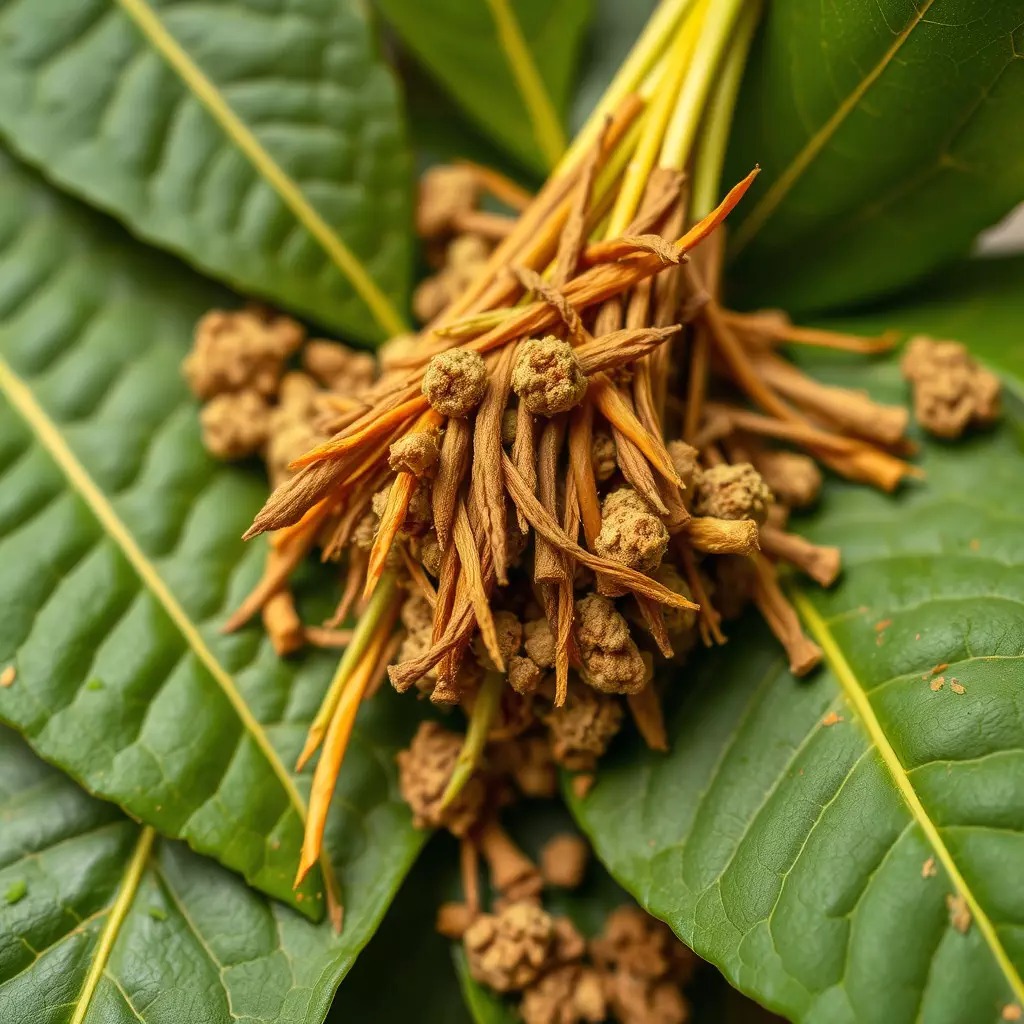Kratom, derived from the Mitragyna speciosa tree, is a natural substance that has garnered attention for its impact on stress response and energy levels. Its active alkaloids, mitragynine and 7-hydroxymitragynine, engage with opioid receptors to influence mood and pain perception, potentially offering an energy boost with kratom by modulating neurotransmitter systems such as serotonin and norepinephrine. This can result in a diminished stress response and improved mood. Kratom's effects vary with strain and dosage, providing either increased alertness or relaxation depending on the user's needs. It's crucial to use kratom cautiously, considering its complex legal status and potential side effects, and to integrate it thoughtfully within a holistic health routine that includes good nutrition, regular exercise, and adequate sleep for optimal benefits. As with any supplement, personalized and safe usage is key when exploring the therapeutic potential of kratom for stress management and energy enhancement.
Stress is an omnipresent factor in modern life, influencing both mental well-being and physical energy. This article delves into the intricate relationship between stress response regulation and the potential benefits of Kratom, a botanical substance gaining attention for its impact on energy levels and overall vitality. We will explore how Kratom’s unique alkaloids can modulate the body’s stress responses, offering insights into their scientific underpinnings. Subsequently, we will discuss integrating Kratom into a holistic approach to manage stress effectively, providing a comprehensive understanding of its role in enhancing energy and promoting wellness.
- Understanding Kratom's Role in Stress Response Regulation and Its Impact on Energy Levels
- The Science Behind Kratom Alkaloids and Their Effects on the Body's Stress Responses
- Integrating Kratom into a Holistic Approach for Managing Stress and Enhancing Vitality
Understanding Kratom's Role in Stress Response Regulation and Its Impact on Energy Levels

Mitragyna speciosa, commonly known as kratom, has garnered attention for its potential role in stress response regulation and its effects on energy levels. Kratom contains a variety of alkaloids, with mitragynine and 7-hydroxymitragynine being the most prevalent, which interact with the body’s opioid receptors, influencing mood and pain perception. This interaction can lead to an attenuation of stress responses by modulating neurotransmitter systems, particularly serotonin and norepinephrine, which are pivotal in mood regulation. Users often report an energy boost with kratom, attributed to its stimulant properties at certain dosages. This energy increase is not merely a rush but a sustained sense of vitality that can enhance mental clarity and physical performance. The nuanced effects of kratom vary depending on the strain and dosage, allowing individuals to potentially manage stress more effectively while experiencing an uplift in energy levels without the jittery side effects associated with traditional caffeinated stimulants. Its unique pharmacological profile suggests that kratom could be a valuable tool for those seeking natural alternatives to regulate their stress response and maintain healthy energy levels throughout the day. However, it is crucial to approach the use of kratom with caution and to consider the legal status and potential side effects in one’s jurisdiction before incorporating it into daily routines.
The Science Behind Kratom Alkaloids and Their Effects on the Body's Stress Responses

Kratom, a tropical evergreen tree native to Southeast Asia, has been the subject of increasing interest due to its alkaloids’ potential effects on the body’s stress response regulation. Mitragynine and 7-hydroxymitragynine are two primary alkaloids found in kratom leaves, each exhibiting distinct pharmacological properties that can influence an individual’s energy levels and stress response. When consumed, these alkaloids interact with the body’s opioid receptors, which can lead to a modulation of the stress response system, particularly the hypothalamic-pituitary-adrenal (HPA) axis. This interaction may result in an energy boost with kratom as users experience a diminished perception of stress and improved mood, potentially due to the activation of dopamine and serotonin receptors. The nuanced effects of kratom alkaloids can offer a natural alternative for individuals seeking to manage their stress levels without the side effects commonly associated with traditional pharmaceuticals.
Furthermore, the stress response regulation by kratom alkaloids is a complex process influenced by factors such as dosage, individual physiology, and the specific strain of kratom. At low to moderate doses, users often report feeling more energetic and alert, which can be beneficial for tackling daily tasks or engaging in physical activities. Conversely, at higher doses, kratom’s effects may become more sedating, which could contribute to relaxation and a decrease in stress-related symptoms. The alkaloids’ ability to interact with various neurotransmitter systems suggests a multifaceted approach to managing the body’s stress response, making it a subject of ongoing scientific research to fully understand its mechanisms and potential therapeutic applications.
Integrating Kratom into a Holistic Approach for Managing Stress and Enhancing Vitality

Kratom, a botanical derived from the leaves of Mitragyna speciosa, has garnered attention for its potential role in managing stress and enhancing vitality within a holistic approach to wellness. Proponents suggest that certain strains of kratom can provide an energy boost with kratom, which may assist individuals in coping with the demands of daily life. When integrated into a comprehensive health regimen that includes balanced nutrition, regular exercise, and adequate sleep, kratom can be a valuable component. It’s important to approach its use judiciously, as the effects can vary based on strain, dosage, and individual physiology. Users may experience heightened alertness and an increase in physical energy, which can be particularly beneficial for those seeking to overcome lethargy associated with chronic stress.
Furthermore, kratom’s interaction with the body’s stress response systems, particularly the hypothalamic-pituitary-adrenal (HPA) axis, has been an area of interest for researchers. By potentially modulating cortisol levels and other stress hormones, kratom may aid in regulating the body’s natural response to stressors. This holistic integration aims to alleviate symptoms such as fatigue, low mood, and mental fogginess often associated with prolonged stress. However, it is crucial to consult healthcare professionals before incorporating kratom into any health regimen, given its potential for interactions with medications and its legal status in various jurisdictions. A balanced approach to managing stress should always prioritize safe practices and be tailored to individual needs and circumstances.
In conclusion, the intricate interplay between kratom’s alkaloids and the body’s stress response systems presents a compelling avenue for individuals seeking to regulate their stress levels and experience an energy boost with kratom. The scientific evidence underscores kratom’s potential in this realm, offering a natural complement to holistic health strategies. As with any approach to wellness, it is advisable to consider professional guidance to ensure safe integration into one’s lifestyle. With a nuanced understanding of its effects and careful implementation, kratom may contribute significantly to the maintenance of balanced energy levels and stress management.






